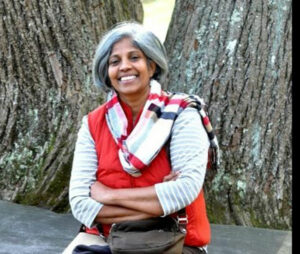By Brett Peruzzi

Photo/submitted
Neela de Zoysa is a Sudbury resident originally from Sri Lanka with a deep knowledge of the natural world in both her adopted country and homeland.
With a scientific background as a botanist, she has become an expert in local flora, teaching at the New England Wildflower Society at Garden in the Woods in Framingham, Sudbury Valley Trustees in Sudbury, and other places. But she maintains strong ties to her home country as well, leading U.S. group tours through the New England Wildflower Society to Sri Lankan rain forests and other destinations on the island to show the natural beauty and biodiversity of where she was raised and educated. And recently, she has become involved in climate change policy formulation for Sri Lanka under the auspices of the United Nations.
“I have loved plants since I was a child,” de Zoysa observed. “I was influenced by my father, who was an avid gardener.”
After obtaining her bachelor’s degree in biology at the University of Colombo in Sri Lanka, with an emphasis in botany, wildlife biology, and conservation, de Zoysa worked as a research assistant in the botany department of another Sri Lankan university, and as a research officer and consultant at the Sri Lankan Department of Forestry, where she did pioneering research in rain forest ecology.
She then moved to England and obtained her master’s degree from the University of Oxford in forestry and landscape management.
“As a recently independent country from Britain, in Sri Lanka, we are somewhat British ourselves, so it was not difficult to adjust. My native language is Sinhalese but I cannot recall a time when I did not speak English – even as a three year old in pre-school. My time in England was very pleasant and I continue to keep in touch with many friends and teachers,” she noted.
A few years later she met her husband, a native New Yorker who was working in Sri Lanka, and they moved to the United States in 1991.
“We lived in Harvard Square in Cambridge for 13 years,” she reminisced. “It was my first home here and I continued my botanical work through the Arnold Arboretum and Harvard University Herbaria,” one of the 10th largest in the world, with over five million specimens.
“My son was born in 1997 and we moved to Sudbury for the usual reasons – good schools, more space, a big garden,” she said.
“All of my family is in Sri Lanka so I travel there twice a year and have done some work there as well, over the years,” de Zoysa explained. “I stay in touch with the local expatriate Sri Lankan community and culture through the Buddhist temple in Grafton, which is helpful.”
One of the most compelling jobs she’s had recently in Sri Lanka was as a consultant for the United Nations Collaborative Programme on Reducing Emissions from Deforestation and Forest Degradation in Developing Countries. As an island nation, Sri Lanka is even more susceptible to such climate change effects as rising ocean levels and extreme weather. Her many years of research in the island’s Sinharaja rain forest, a UNESCO World Heritage Site, as well as her work co-authoring and revising field guides to the country’s trees and shrubs, gave her unique qualifications for the assignment.
“My main area of specialization is in Sri Lankan forest flora,” said de Zoysa. “My research was in rain forests where many species are sensitive to climate change. This was a response to the Kyoto protocol.”
When asked what she liked most about teaching people about flora, de Zoysa replied, “I love plants – and gardening. Sharing my enthusiasm is my biggest joy.”
de Zoysa concluded by explaining how vital plants are to the planet’s health. “Plants are the basic building blocks of the food pyramid. Animals and plants’ survival strategies are evolutionarily inter-twined; plants provide shelter and food and in the process animals act as pollinators and dispersers.”












